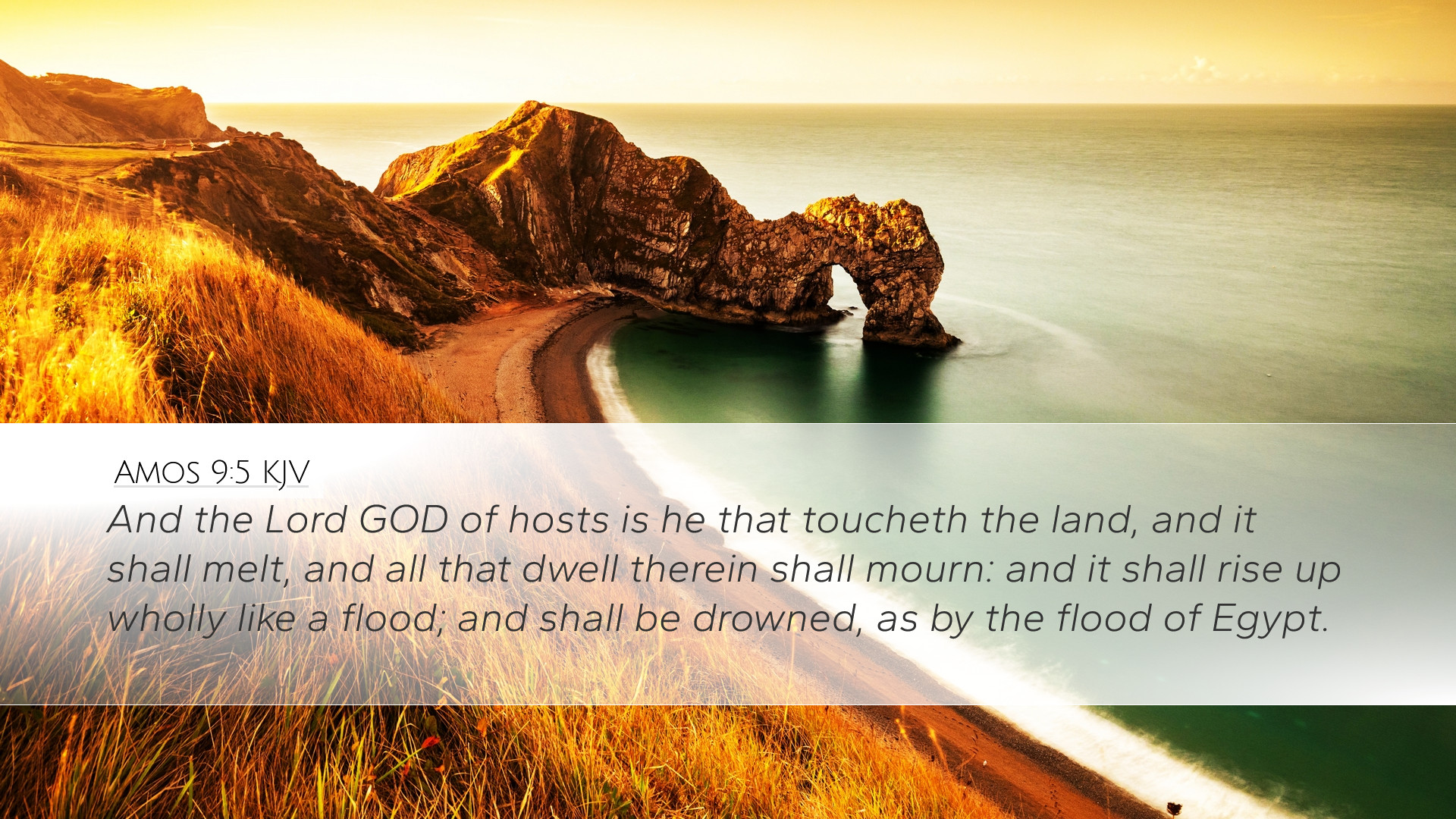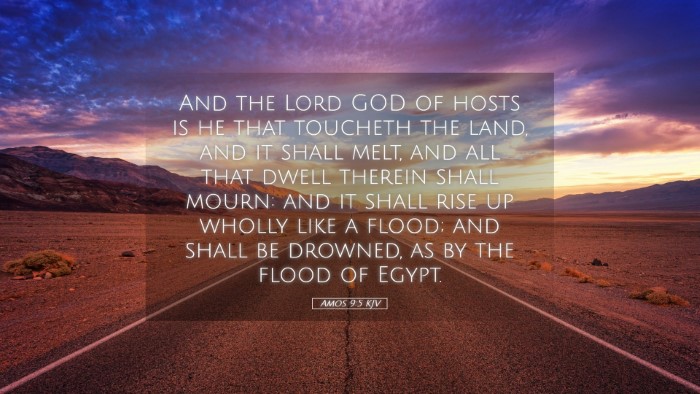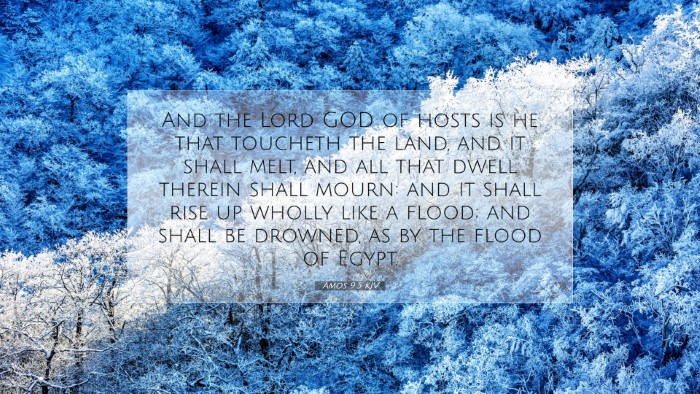Old Testament
Genesis Exodus Leviticus Numbers Deuteronomy Joshua Judges Ruth 1 Samuel 2 Samuel 1 Kings 2 Kings 1 Chronicles 2 Chronicles Ezra Nehemiah Esther Job Psalms Proverbs Ecclesiastes Song of Solomon Isaiah Jeremiah Lamentations Ezekiel Daniel Hosea Joel Amos Obadiah Jonah Micah Nahum Habakkuk Zephaniah Haggai Zechariah MalachiAmos 9:5
Amos 9:5 KJV
And the Lord GOD of hosts is he that toucheth the land, and it shall melt, and all that dwell therein shall mourn: and it shall rise up wholly like a flood; and shall be drowned, as by the flood of Egypt.
Amos 9:5 Bible Commentary
Commentary on Amos 9:5
Amos 9:5 states: "The Lord God of hosts, he that toucheth the land, and it shall melt, and all that dwell therein shall mourn: and it shall rise up wholly like a flood; and shall be drowned, as by the flood of Egypt."
Introduction
This verse emanates a profound sense of divine authority and impending judgment. It serves not only as a warning but also as a reassurance of God’s sovereign control over creation and the destiny of nations. The text encapsulates themes of God’s power, the fragility of human existence, and the certainty of divine retribution.
Summary of Insights
- The Authority of God:
Amos emphasizes the lordship of God, referring to Him as "the Lord God of hosts." This title reflects His supreme authority over both the heavenly realms and earthly events. Matthew Henry remarks on how God’s interaction with creation is not only powerful but also pivotal, causing nature itself to respond to His will.
- Cosmic Reaction to Divine Commands:
The phrase "he that toucheth the land, and it shall melt" denotes the seriousness of God’s commands and their effects on the physical realm. Albert Barnes highlights God’s capability to alter the very fabric of creation. The use of the verb "melts" indicates a complete transformation, reminding believers of their reliance upon God’s mercy.
- Mourning of the Inhabitants:
"All that dwell therein shall mourn" speaks to the consequences of sin and divine judgment. Adam Clarke interprets this as the collective despair of those who have turned away from God’s statutes. The mourning represents not only physical loss but also spiritual disconnect from God's presence.
- Imagery of Catastrophe:
The imagery employed, where the land "shall rise up wholly like a flood," invokes thoughts of destruction and upheaval. This metaphor signifies that the consequences of sin spill over uncontrollably, much like a flood that inundates the land. This reflects the theme of judgment as similarly presented in other prophetic texts.
- Historical Context:
In the context of Amos’s time, the nation of Israel was experiencing prosperity but was simultaneously steeped in immorality. The prophetic warning serves as a call to repentance and recognition of the very real danger of divine judgment. The sentiments echo throughout scripture where God warns and prepares His people.
Detailed Analysis
1. The Sovereignty of God:
Commentators agree that the term "God of hosts" underscores not only God’s authority over creation but also His command over angelic forces and nations. The portrayal of God tapping into the land symbolizes His omnipotence and the notion that the earth is under His governance. Clarke explains that this serves to remind believers of their accountability to live in alignment with God’s principles.
2. Judgment and Restoration:
In line with other prophetic traditions, Amos does not merely threaten destruction; rather, he highlights God's desire for restoration. This duality of judgment and hope is consistent throughout the prophetic literature. Barnes notes that the imagery of melting may also suggest purification, paralleling how fire refines precious metals. This reflects God’s desire to bring forth a remnant that is faithful.
3. The Emotional Landscape of Judgment:
Amos paints a vivid picture of the emotional turmoil that accompanies divine judgment. The mourning of the inhabitants signifies a collective realization of their failures and the consequences that arise from sin. Matthew Henry underscores the gravity of this response, suggesting that such mourning could lead to genuine repentance and a yearning for reconciliation with God.
Theological Reflections
This verse encapsulates several crucial theological reflections relevant for modern believers:
- The Nature of God:
Understanding God’s unwavering authority can foster deeper reverence among believers, enhancing their relationship with Him.
- Human Responsibility:
The mourning signifies that all individuals bear responsibility for their actions, which reflects the call towards personal and communal repentance.
- Hope Amidst Judgment:
The dual themes of judgment and potential restoration remind readers that God’s purpose is ultimately redemptive, a truth echoed in the New Testament context.
Practical Applications for Today
Pastors and theologians can draw numerous practical applications from Amos 9:5:
- Encourage Repentance:
This verse serves as a powerful reminder for congregations about the necessity of turning back to God in times of moral and spiritual decline.
- Promote Awareness of God’s Sovereignty:
In a world filled with chaos, sermons can focus on the assurance that God reigns over all circumstances, encouraging believers to trust in His plans.
- Establish Emotional Resilience:
Understanding the depth of mourning can help communities process grief, loss, and the resultant hope when they turn towards God in their struggles.
Conclusion
Amos 9:5 stands as a profound verse that speaks of God’s authority, the frailty of humanity, and the essential call to repentance. It serves as a reminder to both individuals and communities of the important balance between judgment and hope. The insights drawn from the commentaries of Matthew Henry, Albert Barnes, and Adam Clarke provide a rich tapestry of understanding that enriches our perspective on this significant biblical text.


